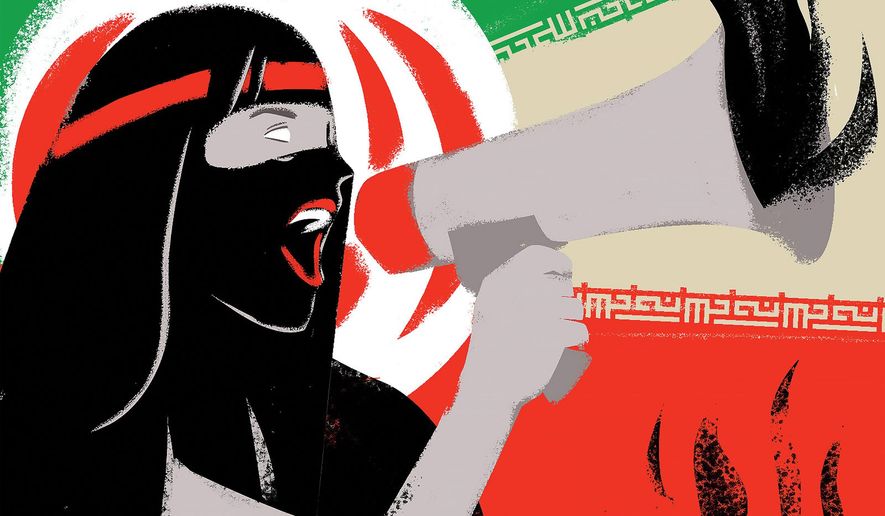OPINION:
The death of Masha Amini, the 22-year-old lawyer who died in the custody of the morality police, has sparked an outcry from tens of thousands of Iranians protesting a theocracy that mandates strict dress codes for women. Masha Amini was arrested — and died — because she was accused of not wearing her hijab properly. How insane. The outcry from the protesters is: Women, life, freedom.
The people in Iran are hurting. Rampant inflation, corruption, political repression, high unemployment, and laws discriminating against women have also fueled the current protests. The regime crushed the pro-democracy Green Movement in 2009 and major protests in 2017 and 2019, but today’s protests hopefully could compel an entrenched theocracy to listen to the people; to refrain from using the Revolutionary Guards to kill and suppress the protesters. The Iran Human Rights group reported many innocent protesters have been killed.
The outcry in cities in the United States and capitals throughout the world in support of the Iranian women — and men — protesting a repressive regime is profound. International support for this female-led revolution is breathtaking. The courage and determination of these women, in the face of harsh reprisals, are inspiring.
These protests are happening at a critical time for the regime in Tehran, negotiating the nuclear agreement — Joint Comprehensive Plan of Action — with the United States. The regime has been insisting on modifying the agreement to include language guaranteeing sanctions relief if any future president withdraws from the JCPOA and, also, concluding any further investigation by the International Atomic Energy Agency (IAEA) of Iran’s past secret nuclear activities. Agreeing to these demands would further embolden the leadership and enhance the domestic credibility of a brutal regime looking for an issue — this issue — to divert the public from their harsh treatment of women. Iran expects the United States and the IAEA to cave to their demands. Caving to their demands would be humiliating and a grave mistake.
The protests in Iran that decry the theocracy’s treatment of women are emblematic of the unfair treatment of women in other countries.
The Fourth World Conference on Women in Beijing from 4 to 15 September 1995 memorialized a Platform for Action — an agenda — for women’s empowerment, redressing years of neglect and promoting gender equality and women’s development globally. Hillary Clinton represented the United States, one of 17,000 participants from 189 countries.
The World Economic Forum in 2006 established a Global Gender Gap Index that benchmarked progress toward gender parity, comparing countries’ gender gaps in four areas: economic participation, education, health and political leadership. The 2022 rankings of 146 countries rank Iran at 143 and Afghanistan as the lowest at 146. Clearly, the women in Iran — and Afghanistan — are being denied their basic human rights.
The current courageous protesters in Iran deserve the support of all countries, especially the United States. The regime in Tehran is working hard to deny internet access to the people of Iran; to ensure that the Iranian people are denied access to the international outrage about the killing of Masha Amini and the government’s brutal efforts to silence the protesters. SpaceX’s Starlink satellite is operating in Iran and getting information into the country, despite the regime’s efforts to block these transmissions.
Speaker of the House Nancy Pelosi has been effusive with praise of the “awe-inspiring” courage of the women protesters and the bipartisan support in Congress in condemning the Iranian government for the murder of Mahsa Amini and its brutal crackdown on the protesters.
The courageous people of Iran who are protesting the theocracy that denies women their legal and moral human rights need our support, especially now.
Indeed, it’s disconcerting that Iran, a country that has total disregard for the basic human rights of women and human life, is a threshold nuclear weapons state that covertly pursued a nuclear weapons capability until 2003. We should, therefore, negotiate returning to the JCPOA judiciously and modify it accordingly, given Iran’s past pursuit of nuclear weapons and sophisticated ballistic missiles — and its involvement in and support to proxies determined to destabilize the region.
• Joseph R. DeTrani is the former director of the National Counterproliferation Center and the former special envoy for negotiations with North Korea. The views are the author’s and not any government agency or department.




Please read our comment policy before commenting.